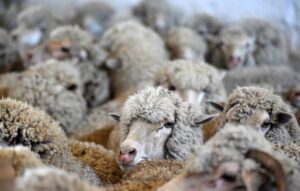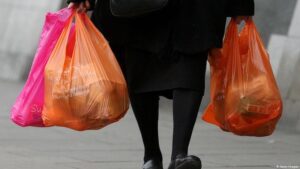
The Ministry of Foreign Affairs of Ukraine and the State Service for Food Safety and Consumer Protection have agreed on the form of an export veterinary certificate for the supply of small livestock to Kuwait with the relevant authority of this country, according to a posting on the website of the State Service for Food Safety and Consumer Protection.
“Ukrainian producers engaged in breeding and raising small livestock are able to compete in the global market. The opening of the Kuwait market for the export of small ruminants creates additional opportunities for them. For our part, my colleagues from the Ministry of Foreign Affairs and I will continue opening new export markets,” Head of the authority Vladyslava Mahaletska said.
The form of this certificate is posted on the website of the State Service for Food Safety and Consumer Protection.
As reported, in May, the State Service for Food Safety and Consumer Protection agreed on the form of an export veterinary certificate for the supply of milk and dairy products to Kuwait.
Over the past six months, in April, eight new markets were opened for Ukrainian exporters, 63 commodity items were repeatedly approved in 11 states and international economic organizations. Markets in Japan, Libya, Argentina and Lebanon were opened for milk and dairy producers. Domestic producers were able to supply eggs to Ethiopia, animal protein to Serbia, and cattle to the UAE. The export of arachnids (insects used to protect agricultural crops) is open to the Lithuanian market.

Ukraine should remain a transit country for Russian gas, and Berlin expects the transit agreement with Russia to be extended, the German government’s official representative, Steffen Seibert, told reporters on Monday in Berlin.
“It remains central for the German government that Ukraine remain a transit country even following the completion of construction on Nord Stream 2. There is a transit agreement,” Seibert said.
The representative said that the current transit agreement “is valid at least until 2024, though the agreement envisages that the parties will review the possibility of extending the agreement until 2034.”
“We expect the agreement to be extended,” Seibert said.

Commissioning of housing in Ukraine in January-March 2021 increased by 20.5% compared to the same period in 2020, to 2.306 million square meters, the State Statistics Service has reported.
At the same time, it is clarified that the data are given taking into account the housing introduced in accordance with the temporary procedure for the acceptance into operation of houses built without permission to perform construction work.
According to the report, since the beginning of the year, 1.609 million square meters have been commissioned in cities (70% of the total), 697,600 square meters in rural areas. At the same time, 43% of the total volume of housing was commissioned in single-family houses, 56.6% – in houses with two or more apartments, 0.4% – in dormitories.
In general, during the reporting period, 30,371 apartments were commissioned, while in cities – 24,100 apartments, in villages – 6,200 apartments.
The average apartment area was 75.6 square meter, while in single-family houses – 158 sq m, in multi-apartment buildings – 54.2 sq m.
In Kyiv, Lviv, Kharkiv, Odesa and Ivano-Frankovsk regions, according to the results of the first quarter, 56% of the total housing volume was commissioned. Moreover, in Kyiv – 145,000 square meters (6.3%).
According to statistics, a decrease in the volume of housing commissioned was recorded in Sumy, Rivne, Kyiv, Ivano-Frankivsk and Volyn regions.

President of Ukraine Volodymyr Zelensky at the Ukraine 30. Ecology forum signed a bill on limiting the circulation of plastic bags on the territory of Ukraine, which the Verkhovna Rada adopted on June 1, into law.
“Five hundred. This is how many packages every Ukrainian uses a year. Twenty minutes. This is how much we use this package on average. More than 100 years. This is how long one package decomposes and a few seconds – to sign a law,” the president said, according to the press service of the head of state.
The document regulates the circulation of plastic bags and should stimulate the development of the production of biodegradable bags.
In particular, the law prohibits the free distribution of plastic bags (except for biodegradable) in retail and catering. Plastic bags should be provided for money only. At the same time, retail prices for such packages cannot be lower than the minimum prices set by the Cabinet of Ministers of Ukraine.
In addition, mandatory labeling of biodegradable bags is envisaged and fines are set for violating these norms.
The document comes into force on the next day after its publication and will be effective six months from the date of entry into force, with the exception of some of its provisions.

Kernel, one of the largest Ukrainian agrarian groups, intends to increase grain exports from Ukraine from 8.5 million to 10 million tonnes in the 2021/2022 fiscal year (July-June), Kernel CEO Andriy Verevsky said during a conference call with analysts.
“We plan to export more than 10 million tonnes of grain in the next fiscal year,” he said.
According to the company, in January-March 2021, Kernel reduced grain exports from Ukraine by 15% compared to January-March 2020, to 1.8 million tonnes.
Kernel said that in the first nine months of the current FY it has fulfilled 75% of its plan for the export of grain from Ukraine, which the company set for this year at 8.5 million tonnes.
In October 2020, the agricultural producer announced plans to increase grain exports from Ukraine in 2020/2021 FY by 20.3%, to 9.5 million tonnes, and sunflower crushing by 1.7%, to 3.5 million tonnes.
Kernel is a large producer and exporter of sunflower oil.

Interfax-Ukraine has prepared a list of the most profitable companies in Ukraine in 2020 based on the financial statements of the companies published by the Ministry of Finance and the State Tax Service in the form of open data at the end of May.
Gas Transmission System Operator of Ukraine (GSTOU) topped the list of companies that posted a net profit of over UAH 10 billion (the company’s profit was UAH 28.36 billion) and its parent company Mahistralni Gazoprovody Ukrainy (MGU, Trunk Gas Pipelines of Ukraine) with UAH 15.29 billion followed it, Pivdenny Mining and Poltava Mining had UAH 18.24 billion and UAH 11.08 billion in profit, respectively, as well as Kyivstar posted UAH 10.37 billion in net profit.
Then, the list of companies with a net profit of over UAH 5 billion, includes PJSC Naftogazvydobuvannia with UAH 6.13 billion, ATB-Market with UAH 5.77 billion and SCM with UAH 5.32 billion.
The top ten most profitable also include the state-owned Ukrgazvydobuvannia with UAH 4.95 billion and Pivnichny Mining with UAH 4.34 billion.
More than UAH 4 billion of net profit last year in Ukraine was received by two more companies: Ukrnafta with UAH 4.27 billion and Ukrhydroenergo with UAH 4.14 billion, and more than UAH 3 billion were also received by two companies: Roshen confectionery corporation with UAH 3.37 billion and Epicenter K with UAH 3.17 billion.
The list of 200 most profitable companies also included 29 corporate investment funds, among which are 24 venture capital funds.